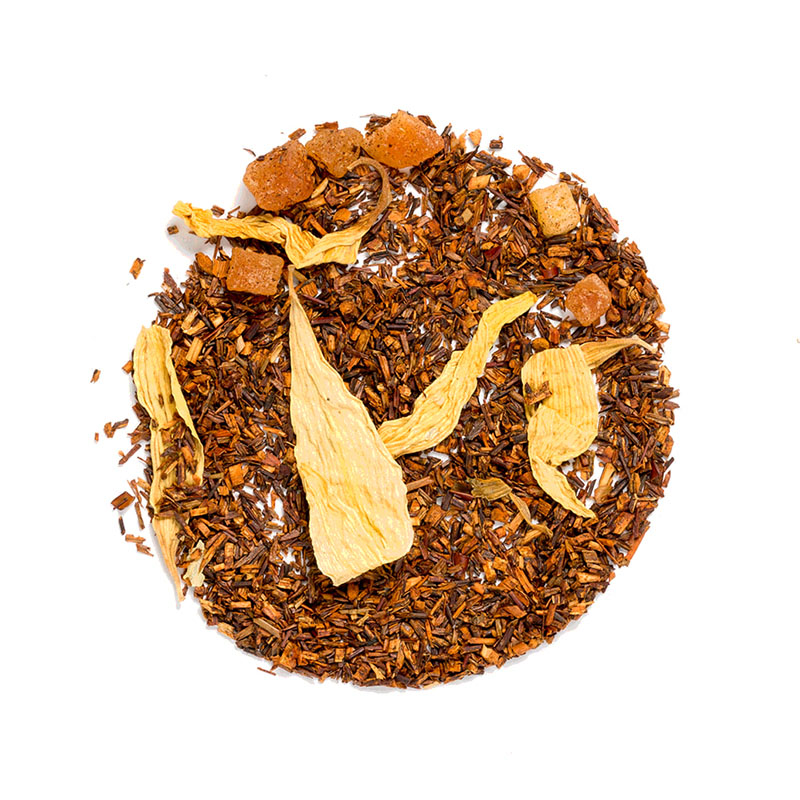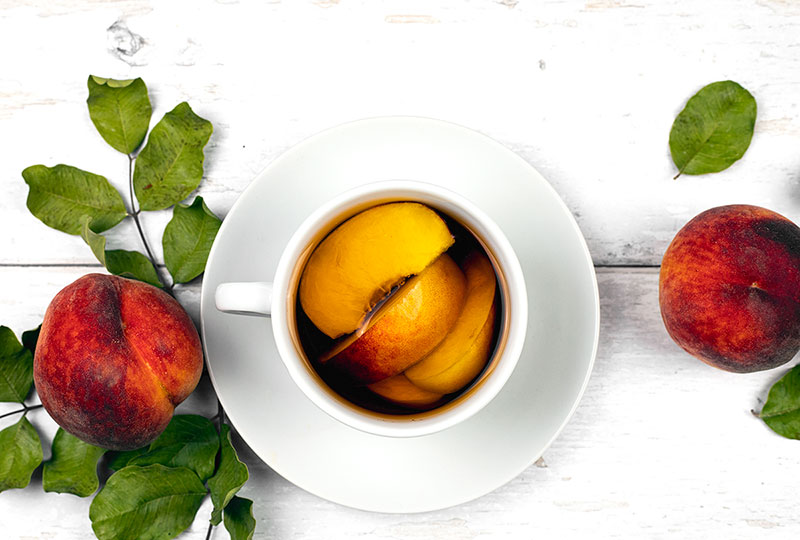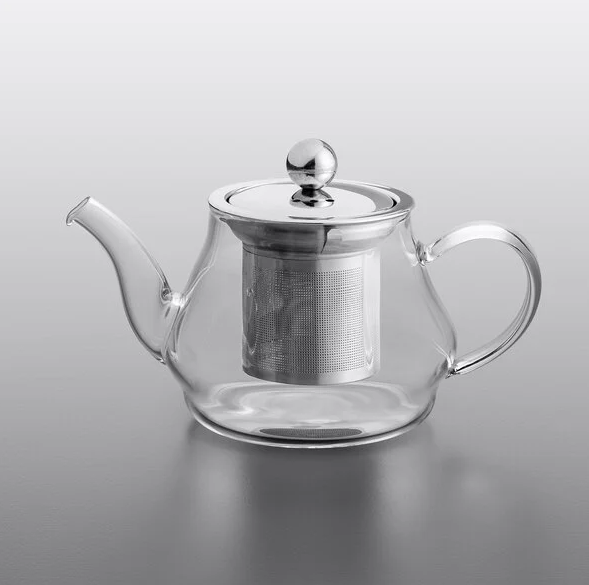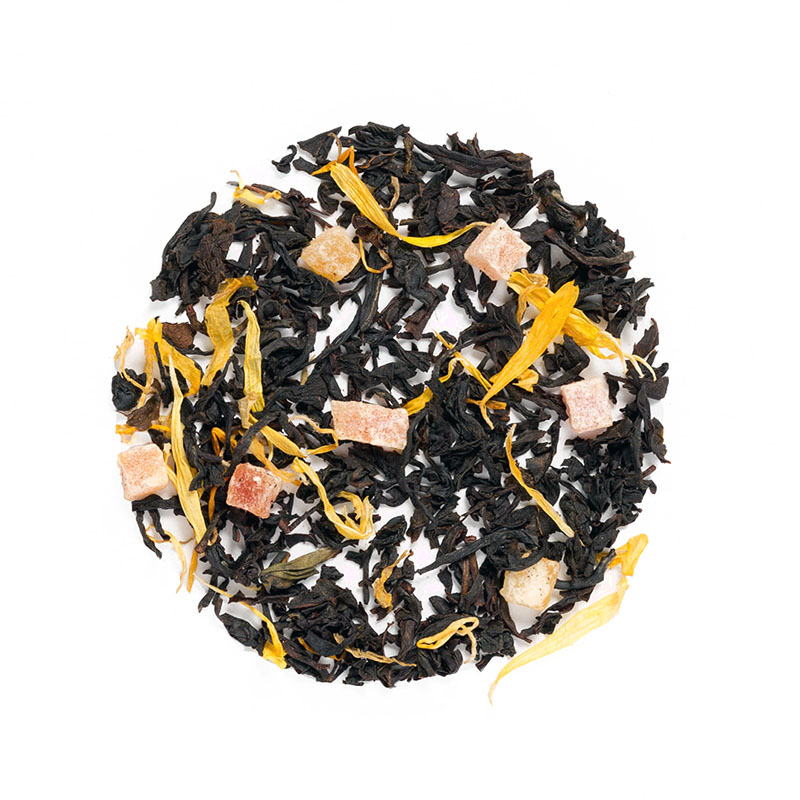Peach Tea Benefits
This post may contain affiliate links. Simple Loose Leaf is a participant in the Amazon Associates Program, an affiliate advertising program designed to provide a means for sites to earn advertising fees by linking to Amazon.com.
Juicy, fuzzy, and delicious–peaches are the some of the best and most popular fruits in the world for flavoring tea. But peach tea is much more than just a flavored drink. No matter blended with real or herbal tea, made with fresh peaches or peach tree leaves, peach tea may provide many benefits too. Learn how to make peach black tea and what are the potential health benefits.
What is peach tea?
Is there caffeine in peach tea?
Pure peach fruit or peach leaf tea doesn’t contain any caffeine. However, peach blends with real tea made from Camellia sinensis plant will contain caffeine. While it’s impossible to say how much caffeine will each blend contain, assume that a cup of peach black tea will have a slightly higher caffeine content than a cup of peach green tea. Peach rooibos tea will be caffeine free, because it doesn’t contain real teaIs peach tea good for you?
There are many types of peach tea and some may be better than the others. Pre-made drinks may contain a lot of unnecessary sugars. Peach loose leaf tea blended with real or rooibos tea may provide numerous benefits, same as pure peach leaf tea. Peach flavored real teas infused with only peach natural flavor will not provide benefits linked to peaches, but will provide antioxidant, anti inflammatory and other activities. Interestingly, peach leaf and bark come packed with benefits too. Both leaves and bark are not uncommon at all. They are used in Ayurveda, a traditional Indian medicine for treating stomach problems, indigestion, diarrhoea, dysentery and hepatitis[1]. Peach black and green tea may offer a whole range of health benefits too. Both black and green tea include antioxidants, L-theanine, and caffeine. They may help boost immune system, provide anti inflammatory activity, help lower blood sugar and blood pressure and aid weight loss.
Peach flavored herbal tea with rooibos
Benefits of Drinking Peach Tea
Regardless if you are drinking peach leaf tea or peach tea blended with real or rooibos tea, you may expect a lot of potential health benefits.1. Antioxidant and anti inflammatory activity
Peach fruit, including the peel, specially fresh may provide high antioxidant and free radical scavenging activity[2] and anti inflammatory activity. Both are important to boost immune system and help body fight inflammations. Studies showed that leaf from the peach tree has an antioxidant potential as well[3].2. Antimicrobial activity
Studies showed that peach leaf possesses antimicrobial activity. EGCG, a catechin abundant in green tea possesses antimicrobial activity too. In black tea, antimicrobial activity comes from theaflavin.3. Help with constipation
Traditionally, peach leaves tea has been used for its potential laxative effect. Studies confirmed that that may be helpful in treating constipation.4. Lowering blood sugar
Studies showed that peach leaf contains multiflorin, a chemical compound that may help lower blood sugar[4]. Fruity peach tea blended with real or herbal teas such as green and black[5], and herbal rooibos tea[6], may help lower blood sugar too and help in treating type 2 diabetes.5. Aiding weight loss
Both green and black peach tea may help with your weight loss goals. Studies suggest that polyphenols in tea may help reduce calorie intake and increase fat burn[7].How to make homemade peach tea
To make a cup of juicy, sweet and delicious cup of peach tea try making it from a scratch. You can adjust the ratios to suit your taste and replace black with herbal tea. Homemade peach tea tastes great both hot and iced, so feel free to add ice. Always choose ripe peaches because they will have much more sweetness and natural flavors.
To make peach tea you will need:
- 1-3 perfectly ripe peaches, depending on the size
- 1-2 teaspoons of honey
- 1 spoon of strong black loose leaf tea Organic Assam
- 500 ml of water
- 1 cotton tea bag or paper filter (optional)
- Wash and de-seed peaches. Cut them into small chunks.
- Place the tea leaves into a tea bag. Although you can avoid this step, it will make brewing much easier. You should never steep black tea for more than 5 minutes. Tea bag will make it easier to remove the tea leaves but leave peaches in the teapot.
- Put tea leaves and peaches into a teapot.
- Bring fresh spring water to a boil.
- Pour the hot water into a teapot and let it steep for 5 minutes.
- Remove the tea bag.
- Add honey.
Disclaimer: This article is for informational purposes only. It’s not intended to replace medical advice, diagnosis or treatment. Every person is different and may react to different herbs and teas differently. Never use teas or herbs to treat serious medical conditions on your own. Always seek professional medical advice before choosing home remedies.
References:
[1] https://www.homesciencejournal.com/archives/2016/vol2issue3/PartG/2-3-40.pdf [2] https://www.researchgate.net/publication/323258290_A_Review_on_Peach_Prunus_persica_An_Asset_of_Medicinal_Phytochemicals [3] https://www.researchgate.net/publication/323258290_A_Review_on_Peach_Prunus_persica_An_Asset_of_Medicinal_Phytochemicals [4] https://pubmed.ncbi.nlm.nih.gov/22863923/ [5] https://www.diabetes.co.uk/food/tea-and-diabetes.html [6] https://www.ncbi.nlm.nih.gov/pmc/articles/PMC6017582/ [7] https://www.ncbi.nlm.nih.gov/pmc/articles/PMC6273558/
More from:
SLL






Leave a comment